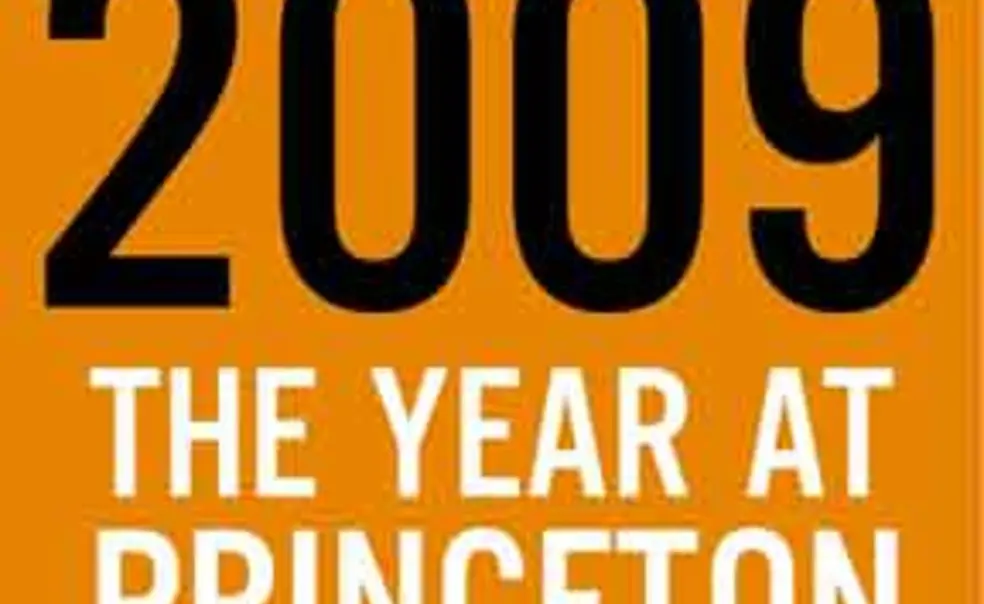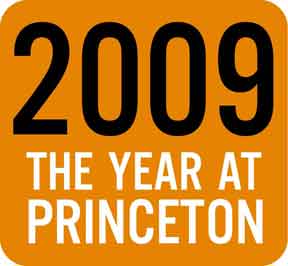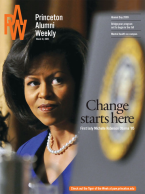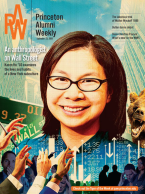Top five PAW features of 2009
1. Inventing the future, by Joel Achenbach ’82
 Nathan Myhrvold *83 has one of the premier résumés of the digital age. He didn't merely work in software; he founded Microsoft Research and spent 13 years as an all-purpose sage and eccentric genius at the side of Bill Gates.
Nathan Myhrvold *83 has one of the premier résumés of the digital age. He didn't merely work in software; he founded Microsoft Research and spent 13 years as an all-purpose sage and eccentric genius at the side of Bill Gates.
He didn't merely study physics and math; he studied them at Princeton, where the physics and math faculties are among the best in the world -- and then he flew off to Cambridge for some tutelage at the feet of Stephen Hawking.
He doesn't merely like to cook: He's a master chef (and has worked in one of Seattle's best restaurants) who once won a barbecue contest in Memphis. He doesn't just take pictures: He's an award-winning wildlife photographer. ... (Jan. 28)
2. Mrs. Obama goes to Washington, by Peter Slevin ’78
It was Inauguration Day. The 44th president had just taken the oath of office, and his brother-in-law, Craig Robinson ’83, was checking out his sister's new digs, better known as the White House. A staff member, one of 93 who work for the first family, gave Robinson and his wife, Kelly, a tour that took them to the Truman Balcony, overlooking the South Lawn and the Washington Monument beyond."We took in the view and the history. My wife and I were just shaking our heads," Robinson says. "When you grow up in a place that's one-bedroom, one-bath, you're not thinking at any point, 'My sister's going to live in the White House,' or 'My mother's going to live in the White House.' "
Live there they do, completing an improbable journey that took Michelle Obama ’85, the daughter of a city utility worker, from a small walkup in South Shore on Chicago's South Side to the heart of American political power. ... (March 18)
3. The cosmic apocalypse, by Mark Alpert ’82
 "Some say the world will end in fire, some say in ice." -- Robert Frost.
"Some say the world will end in fire, some say in ice." -- Robert Frost.
It's perhaps the scariest question one can contemplate. Will the universe die? Will all the planets, stars and galaxies in the cosmos, and all the myriad forms of life that they sustain, eventually cease to exist? Astronomers long have known that the earth is doomed; in about 5 billion years the sun will run out of hydrogen fuel and swell to gigantic size, vaporizing our planet. But will there always be new stars born from the ashes of their predecessors, and new planets for life to colonize?
Most cosmologists -- the scientists who study the shape, structure, and history of the universe -- are not very hopeful on this point. The universe has been expanding ever since the Big Bang started nearly 14 billion years ago. In the late 1990s researchers were shocked to discover that the cosmic expansion isn't slowing down as they had expected. Instead, it's speeding up. ... (Feb. 11)
4. Margaret Mead meets Morgan Stanley, by Mark F. Bernstein ’83
As plumes of smoke billow from the international banking system, it is wise to assess how we got here. The current economic crisis has been attributed to many things, from the deregulation of the financial-services industry to sheer greed and stupidity. Karen Ho *03 offers a different and more pungent diagnosis in her new book, Liquidated: An Ethnography of Wall Street (Duke University Press): The crash is the natural result of a Wall Street culture in which the self-proclaimed smartest people in the world came to believe that high share prices trumped all other corporate values and, in doing so, imposed their ethos of live-for-today risk-taking on the economy at large.Among the slew of recent books assessing the crisis, it is Ho's methodology as much as her analysis that stands out. Her book -- which is based on her Princeton dissertation -- is neither an economics primer nor a tell-all. Ho is an anthropologist... (Sept. 23)
5. Do it yourself scholars, by Merrell Noden ’78
 It's a bitterly cold January night in Harlem, but inside the Hue-Man Bookstore & Café on Frederick Douglass Boulevard, Jeff Perry ’68 is just getting warmed up. He's been talking to a rapt audience for almost an hour about one of his greatest passions -- the radical writer, educator, and orator Hubert Harrison.
It's a bitterly cold January night in Harlem, but inside the Hue-Man Bookstore & Café on Frederick Douglass Boulevard, Jeff Perry ’68 is just getting warmed up. He's been talking to a rapt audience for almost an hour about one of his greatest passions -- the radical writer, educator, and orator Hubert Harrison.
Perry recently published the first volume of a two-volume biography of this forgotten giant, one he hopes will restore Harrison to the lofty place he deserves in early 20th-century African-American history, which tends to get framed as a struggle between Booker T. Washington and W.E.B. DuBois. "This will force people to include Harrison," says Perry. "It will change the way people look at African-American history." ... (April 22)
Honorable mention: Issue in doubt, by Michael Goldstein ’78; Not your parent's dorm room, by W. Barksdale Maynard ’88















No responses yet